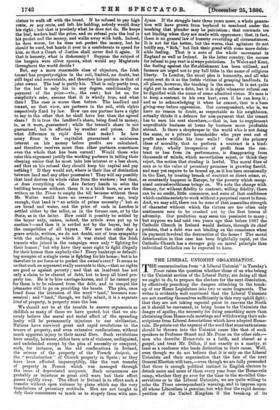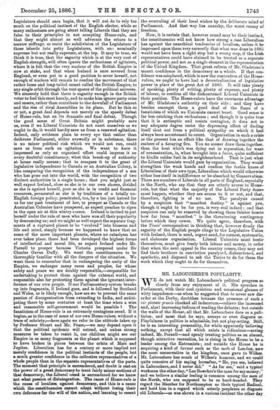THE LIBERAL UNIONIST ORGANISATION. T HE communication from "A Liberal Unionist"
in Tuesday's Times raises the question whether those of us who belong to the Unionist section of the Liberal Party, are doing all that we ought to do, to prepare the electors for the next dissolution, by effectively preaching the dangers attaching to the break- up of our Home Legislature into two or more fragments. The writer is evidently well convinced that the Liberal Unionists are not exerting themselves sufficiently in this very uphill fight; that they are not taking especial pains to canvass the North as it should be canvassed, to bring home to the Unionists the danger of apathy, the necessity for doing something more than abstaining from Home-rule meetings and withdrawing their sub- scriptions from Liberal Associations which have adopted Home- rule. He points out the urgency of the need that some enthusiasm should be thrown into the Unionist cause like that of such speakers as Professor Stuart and Mr. Pease on the other side,— men who describe Home-rule as a faith, and almost as a gospel, and treat Mr. Dillon, if not exactly as a martyr, at least as a confessor who lends distinction to their cause. Well, even though we do not believe that it is only on the Liberal Unionists and their organisation that the fate of the next General Election will turn,—even though we are fully persuaded that there is enough political instinct in English electors to detach more and more of them every year from the Home-rule camp, whether they go over for the time to the so-called Con- servatives or to the Liberal Unionists, we are quite willing to echo the Times correspondent's warning, and to impress upon all whose Liberalism is genuine, but who fear the rapid decom- position of the United Kingdom if the break-up of its
Legislature should once begin, that it will not do to rely too much on the political instinct of the English elector, while so many enthusiasts are going about telling Liberals that they are false to their principles in not accepting Home-rule, and that they might almost as well advocate the return to a narrow suffrage, as resist the subdivision of the Legislature of these islands into petty Legislatures, with on: nominally supreme but not really supreme, at the top. It may be true, we think it is true, that the sagacity which is at the very root of English strength, will often ignore the enthusiasm of agitators, where it is felt that the very nucleus of the British Empire is now at stake, and that when Ireland is once severed from England, or even put in a good position to sever herself, not enough of nucleus will remain to confine the movement of that rather loose and long-tailed comet called the British Empire, to any single orbit through the vast spaces of the political universe. We sincerely hold that there is sagacity enough in the British voter to feel this most keenly, and to make him ignore party cries and sneers, rather than contribute to the downfall of Parliament and the rise of rival Assemblies in its place. But be this so or not, a great deal depends not merely on the speedy defeat of Home-rule, but on its dramatic and final defeat. Though the good sense of Great Britain might probably save us, even if we Liberal Unionists do not exert ourselves as we ought to do, it would hardly save us from a renewed agitation. Indeed, only evidence plain to every eye that rather than dethrone Parliament, either avowedly or in substance, there is no minor political risk which we would not run, could save us from such an agitation. We want to have it impressed as only an organised effort could impress it on every doubtful constituency, what this break-up of authority at home really means ; that to compare it to the grant of legislative independence to Canada or an Australian Colony, is like comparing the recognition of the independence of a son who has gone out into the world, with the recognition of two distinct authorities in a single home ; that you might just as well expect Ireland, close as she is to our own shores, divided as she is against herself, poor as she is in credit and financial resources, permeated as she is by traditions of a totally English foreign foreign policy, penetrated, too, by a too just hatred for us for our past treatment of her, to prosper as Canada or the Australian Colonies have prospered, as expect peaches to ripen in the open air at this wintry s:ason. Ireland is invited to put herself under the rule of men who have won all their popularity by denouncing us; and we might as well expect the separate frag- ments of a ruptured planet to be " evolved " into blossom and life and mind, simply because we happened to know that on some of the more important planets, where no cataclysm has ever taken place, there had been developed the highest forms of intellectual and moral life, as expect Ireland under Mr. Parnell to prosper because Victoria prospered under Sir Charles Gavan Duffy. We want the constituencies to be thoroughly familiar with all the dangers of the situation. We want them to remember that in endangering the unity of the Empire, we endanger many races and peoples, for whose safety and peace we are doubly responsible,—responsible for undertaking to protect them against the external world, and responsible also for protecting them against the ignorant inter- ference of our own people. Ti our Parliamentary system breaks up into fragments, if Ireland goes, and is followed by Scotland and Wales, as is likely enough, how are we to prevent the same passion of disorganisation from extending to India, and antici- pating there by some centuries at least the time when a wise and reasonable self-government would be possible ? The fanaticism of Home-rule is an extremely contagions creed. If it begins, as in the case of some of our own Home-rulers, without a trace of sobriety,—here again we refer to the attitude taken up by Professor Stuart and Mr. Pease,—we may depend upon it that the political epidemic will extend, and unless strong measures be taken to resist it, our children might see our Empire in as many fragments as the planet which is supposed to have broken in pieces between the orbits of Mars and Jupiter. Liberalism has for a century or more implied not merely confidence in the political instincts of the people, but a much greater confidence in the collective representatives of a whole people than in the separate representatives of the parts. The moment that principle is surrendered, and doubt is cast on the power of a great democracy to treat fairly minor sections of that democracy, the Liberal creed is surrendered for we know not what passion of disintegration. The cause of Home-rule is the cause of localism against democracy, and this is a cause which the constituencies cannot adopt without losing their own deference for the will of the nation, and learning to resent the overruling of their local wishes by the deliberate mind of Parliament. And that way lies anarchy, the worst enemy of freedom.
Now, it is certain that, however sound may be their instinct, the constituencies will not know how strong a case Liberalism has against the anarchical tendencies of localism, unless it be impressed upon them very earnestly that what was done in 1885 would not have been a right step but a wrong step, if the Irish representatives could have claimed to be treated as a separate political power, and not as a single element in the representation of the United Kingdom. That great reform of Mr. Gladstone's meant confidence in the democracy as a whole. If that con- fidence was misplaced, which is now the contention of the Home- rulers, we ought to have had a decentralisation of legislative power in place of the great Act of 1885. It will take plenty of speaking, plenty of writing, plenty of expense, and plenty of labour, to confirm all the disheartened Liberal Unionists in their position. The Home-rulers have the enormous advantage of Mr. Gladstone's authority on their side ; and they have besides amongst them a good deal of the flame of a fanaticism of which we Unionists cannot boast. Good sense is far less catching than enthusiasm ; and though it is quite true that it is antiseptic and resists contagion, it does not in any adequate degree resist the depressing effect of finding itself shut out from a political sympathy on which it had always been accustomed to count. Organisation in such a crisis as the present has an effect like that of drawing together the embers of a decaying fire. You no sooner draw them together, than the heat which was dying out in separation, for want of concentration, is, when brought into a focus, quite sufficient to kindle colder fuel in its neighbourhood. That is just what the Liberal Unionists would gain by organisation. They would strengthen the weak hands and confirm the feeble knees of Liberalism of their own type, Liberalism which would otherwise either lose itself in indifference or be absorbed by Conservatism. There are numbers of Liberals in all parts of England, especially in the North, who say that they are utterly averse to Home- rule, but that what the majority of the Liberal Party desire must happen, whether they are averse to it or not, and that, therefore, fighting is of no use. The paralysis caused by a suspicion that "manifest destiny" is against you, though it ought to be for you, is very real indeed ; and that suspicion can only be removed by showing these fainter hearts how far from " manifest " is the threatening contingency before which they cower. We quite agree, therefore, with the Times' correspondent in thinking that, however firmly the sagacity of the English people clings to the Legislative Union with Ireland, there is need, urgent need, for earnest, systematic, and elaborate organisation. Liberal Unionists must bestir themselves, must give freely both labour and money, in order that when the next appeal to the country comes, they may not find their brothers in conviction paralysed, disheartened, and apathetic, and disposed to ask the Tories to do for them the work which they ought to do for themselves.



































 Previous page
Previous page